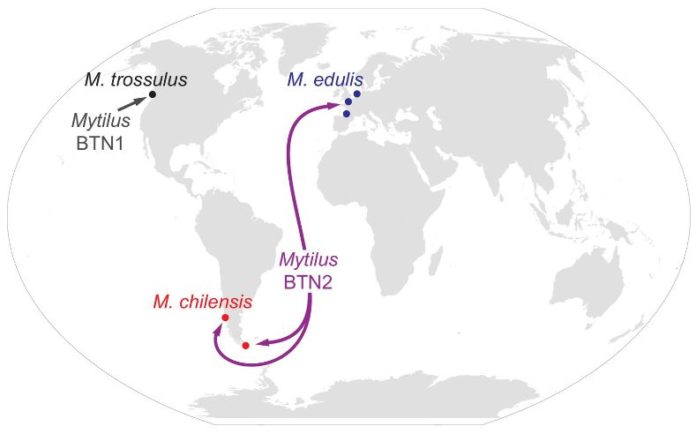Marisa Yonemitsu of the Pacific Northwest Research Institute in Seattle and her colleagues from Canada, the USA and France have discovered the same type of contagious cancer in several mollusc populations in Northern Europe and South America. These populations belong to different species, and the ancestor of this tumour appears to have originated in a third species. Scientists believe that the spread of cancer around the world helped transport – mussels attached to the bottom of ships and crossed the oceans.
Tumours can occur in almost all animal species, but in the vast majority of cases, they are not transmitted between organisms – interferes with the immune system, which reacts aggressively to the appearance of strangers. However, there are several cases where cancer can become contagious. This occurs when the genetic barrier between the species in the population is quite low, in other words, when the population is monotonous and consists mainly of relatives. Perhaps this is why contagious cancer affects Tasmanian devils who live on a small island, and domestic dogs, which all came from a small ancestral wolf population.
Contagious (vector-borne) mollusc cancer is a kind of leukemia. At least four species of molluscs are known to have it, but only in one case has it been traced the pedigree of this tumour. It is called BTN1 (bivalve transmissible neoplasm), it suffers from mussels of the type Mytilus trossulus and, apparently, it comes from Canada – more precisely, from the body of mussels, which lived in Canada.
Scientists tried to transplant the cells of this tumor to other species, but it was possible only if they belonged to the same species as the donor. However, in nature midi sometimes form interspecies hybrids, and then the hybrid also inherits contagious cancer.
Unexpectedly, scientists discovered that some of these mollusks are chimeras, that is, they carry foreign DNA. It was not similar to the DNA of another individual of the same species, but rather resembled the genes of M. trossulus. At the same time, this DNA was quite small – not enough to decide that mollusks are hybrids of two types.
Scientists have suggested that molluscs may be infected with the tumour BTN1, which is rampant among M. trossulus. They collected samples of mussels from France and the Netherlands, where a wave of mollusc deaths took place a few years ago. They also studied M chilensis from Chile and Argentina, where cases of neoplasia are also known. In all cases, the DNA of the contagious cancer turned out to be similar to each other, but not similar to the already known tumor BTN1. This means that this new type of cancer, which originated in M. trossulus, infected M. edulis and M. chilensis and spread to the North Atlantic coast and the Southern Pacific coast.
The new cancer was called BTN2. Researchers believe it may have first appeared in molluscs in the Baltic Sea or on the coast of Norway. However, it is difficult to say for sure, because it is necessary to compare the genomes of mussels from different populations, but not all of them have already been cut off.
Exactly how the tumour penetrated from the northern hemisphere to the southern hemisphere is also unknown. This could hardly have happened naturally, as these species of mussels do not live in equatorial latitudes. Scientists believe that the spread of the tumour contributed to ships: mussels often grow on the bottoms of ships, and thus could move between the hemispheres and oceans.
